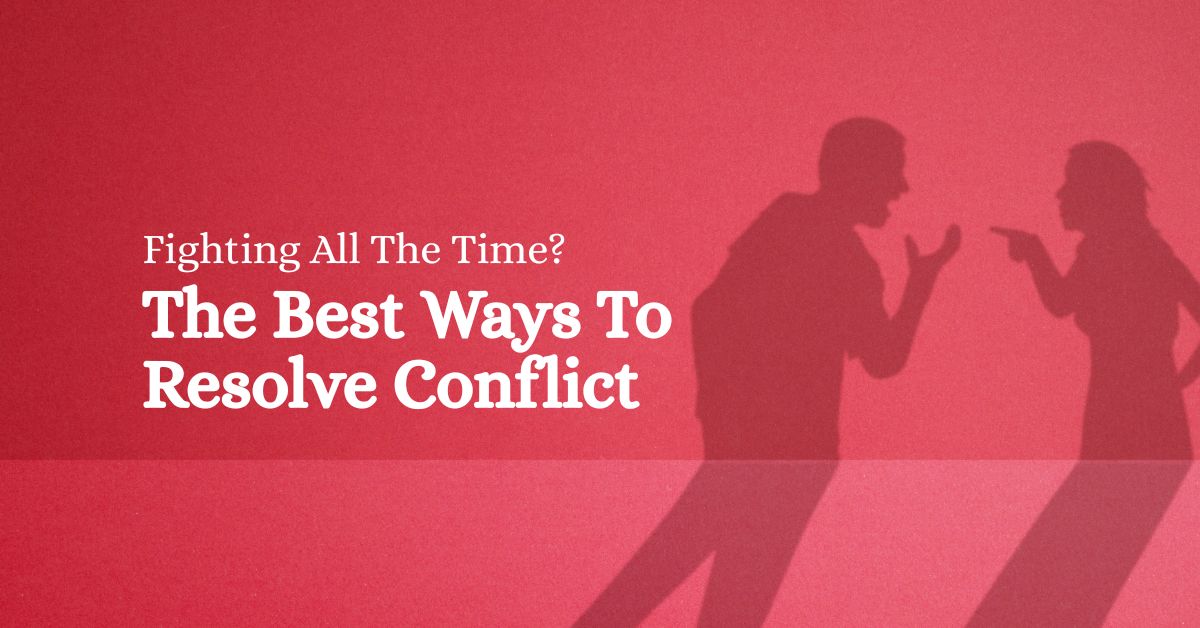
Fighting All The Time? The Best Ways To Resolve Conflict
Relationship conflict is natural, even in the best partnerships. However, ongoing arguments or unresolved conflicts can take a toll on your connection and happiness. The good news is that with intentional effort and actionable strategies, you can address disputes constructively and foster a deeper bond.
This guide explores practical ways to resolve relationship conflict and highlights how healthy communication can strengthen your love life.
Understanding the Root of the Conflict
The first step in relationship conflict resolution is recognizing the true source of disagreements. Often, what couples argue about on the surface isn’t the real issue. For example, a seemingly trivial disagreement about how money is spent may actually stem from differing values around financial security.
Take time to assess your underlying needs, fears, and emotions. Ask yourself questions like:
- Am I feeling unheard or unappreciated in this relationship?
- Is unresolved past hurt influencing my reactions?
- Are external stressors, such as work or health concerns, impacting my mood and communication?
By identifying core issues, you can work toward resolving conflicts at their source rather than continually arguing over surface-level frustrations.
Practice Active Listening
When tempers flare, it’s easy for both partners to focus on getting their point across. However, effective conflict resolution relies on a skill called active listening. This approach requires giving your partner full attention and genuinely seeking to understand their perspective.
Here’s how to practice active listening:
- Avoid interrupting: Resist the urge to correct or rebut while your partner is speaking. This shuts down communication.
- Show you’re listening: Use nods, appropriate facial expressions, and affirming phrases like “I understand” or “That makes sense.”
- Paraphrase for clarity: Once they finish speaking, summarize what they’ve said in your own words to confirm you understand.
- Empathize: Acknowledge their feelings, even if you don’t completely agree. Statements like “I can see that upset you, and I want to fix it” go a long way.
Active listening helps defuse tension, rebuild trust, and create a safe space for honest conversations.
Shift From “Me vs. You” to “Us vs. the Problem”
One of the most damaging mindsets in a relationship is treating your partner as the enemy during disagreements. This often leads to defensiveness, blame-shifting, and escalating arguments. Instead, reframe conflicts as challenges the two of you can tackle together.
To make this mental shift:
- Drop the blame game: Focus on resolving the situation rather than assigning fault.
- Use inclusive language: Say “we” and “us” rather than “I” and “you” to reinforce partnership.
- Collaborate on solutions: Work together to brainstorm resolutions that meet both partners’ needs.
By approaching conflict as a team, you transform disagreements into opportunities for growth and cooperation.
Break Harmful Communication Habits
Unhealthy communication patterns can exacerbate conflict and cause lasting damage to your relationship. Identifying and eliminating these habits is crucial for fostering constructive dialogue.
Some common harmful behaviors include:
- Criticism: Attacking your partner’s character instead of addressing specific actions.
- Stonewalling: Shutting down or refusing to engage during disagreements.
- Defensiveness: Rejecting responsibility and making excuses rather than owning up to mistakes.
- Name-calling or insults: Resorting to disrespectful language when frustrated.
Instead, strive for communication rooted in respect, empathy, and kindness. If you catch yourself falling into negative patterns, pause, take a deep breath, and reset.
Use “I Statements” to Express Feelings
When bringing up concerns, it’s tempting to frame issues as your partner’s fault. Statements like “You never listen to me” or “You’re so careless with my feelings” can quickly put them on the defensive. A more effective approach is using “I statements,” which focus on your own feelings and experiences without blaming.
Here’s how to structure an “I statement”:
- Start with “I feel…” followed by a specific emotion (e.g., “hurt,” “disrespected,” or “understood”).
- Explain the behavior that triggered your feelings.
- End with a request or proposed solution.
For example, instead of saying, “You never spend time with me,” try, “I feel lonely when we don’t do things together. Can we set aside one evening a week for a date night?”
This approach reduces defensiveness and makes it easier for your partner to empathize with your perspective.
Take a Timeout When Arguments Escalate
Heated arguments can spiral quickly, making it difficult to resolve conflict effectively. If discussions become overly emotional or aggressive, it’s often best to take a brief break to cool off.
Here’s how to take a productive timeout:
- Set a specific timeframe: Agree to reconvene after 20-30 minutes to continue the conversation.
- Use the pause wisely: Spend this time engaging in calming activities, such as deep breathing, a brisk walk, or listening to soothing music.
- Return with intention: When you resume the discussion, focus on finding solutions rather than rehashing grievances.
Timeouts prevent fights from escalating and give both partners the space to approach conflicts with a clearer head.

Develop a Conflict Resolution Plan
Having a plan in place for managing conflicts can help partners feel more secure and prepared during disagreements. This plan should outline ground rules for discussions, ensuring that both individuals feel heard and respected.
Consider including the following in your conflict resolution plan:
- Agree on calm communication: Commit to speaking respectfully and avoiding yelling or interrupting.
- Schedule regular check-ins: Dedicate time for open, nonjudgmental conversations about relationship issues.
- Determine when to seek help: Decide as a couple when it’s appropriate to involve a counselor or mediator.
Having mutually agreed-upon guidelines lays the groundwork for healthier interactions.
When to Seek Professional Support
Sometimes, even with the best intentions and efforts, couples can struggle with persistent or deeply rooted conflicts. This is especially true if past experiences, such as divorce or loss, complicate the dynamics of dating later in life.
Seeking professional support from a therapist or counselor can provide valuable tools and insights for navigating challenges together. A skilled professional can facilitate productive conversations, help you understand each other’s perspectives, and guide you toward solutions that work best for your unique relationship.
Investing in professional help is not a sign of failure—it’s a proactive step toward strengthening your connection.
Cultivate a Relationship Built on Appreciation
Conflict often overshadows the positive aspects of a relationship, leaving both partners feeling disconnected and undervalued. Rebuilding a foundation of appreciation can counterbalance this negativity and foster a stronger bond.
To show appreciation:
- Express gratitude daily. Whether it’s a kind gesture or words of affirmation, acknowledge what your partner does well.
- Focus on their strengths rather than dwelling on flaws.
- Celebrate small wins together, like resolving an argument calmly or trying a new approach to communication.
When you both feel cherished and respected, conflicts are less likely to escalate, and your relationship will feel more rewarding overall.
By applying these principles, you’ll develop the skills and understanding needed to resolve conflicts constructively, deepen your connection, and enjoy a healthier, happier relationship at this stage in life. A little effort goes a long way in turning fights into opportunities for growth and strengthening the bond you share.











